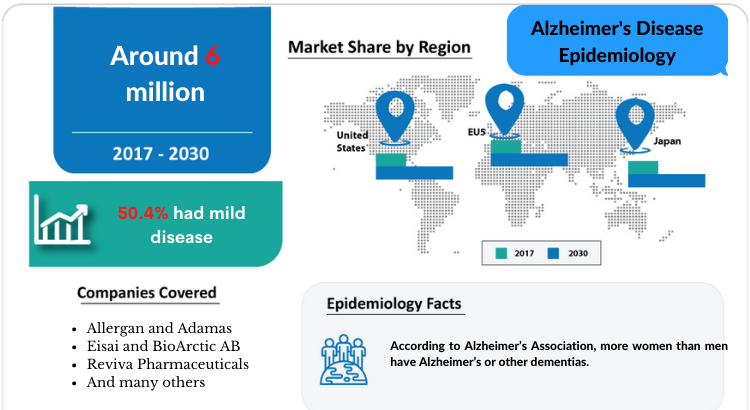“Alzheimer’s disease Epidemiology” report has been added to DelveInsight
Overview of Alzheimer’s disease epidemiology, pathophysiology, various diagnostic approaches, and treatment algorithm, including detailed chapters for marketed products and emerging therapies
Download free sample copy here- https://www.delveinsight.com/sample-request/alzheimers-disease-ad-epidemiology-forecast
Alzheimer’s disease Overview
Alzheimer’s disease is a debilitating neurological disorder that gradually erodes memory and cognitive abilities, as well as the ability to perform even the most basic tasks. Alzheimer’s patients have difficulty doing simple tasks such as driving a car, preparing a meal, or paying bills. They can repeatedly ask the same questions, become easily disoriented, accidentally drop or misplace objects, and find even simple things perplexing. Some people become worried, frustrated, or aggressive as the disease progresses.
Alzheimer’s disease: Geography Covered
- The United States
- EU5 (Germany, France, Italy, Spain, and the United Kingdom)
- Japan
Alzheimer’s disease Epidemiology Insights
Alzheimer’s is a progressive disease, where dementia symptoms gradually worsen over a number of years. In early stages, memory loss is mild, but with late-stage Alzheimer’s, individuals lose the ability to carry on a conversation and respond to their environment. Alzheimer’s is the sixth-leading cause of death in the United States. On average, a person with Alzheimer’s lives 4–8 years after diagnosis, but can live as long as 20 years, depending on other factors.
Key facts of the Alzheimer’s disease epidemiology report
- In 2020, as many as around 6 million Americans were living with Alzheimer’s disease and it was observed that younger people may get Alzheimer’s disease, but it is less common. It was also noted that the number of people living with the disease doubles every 5 years beyond age 65 (Centers for Disease Control and Prevention, 2020).
- Nearly one-half of patients with Alzheimer’s disease have the moderate to severe disease (Yuan et al. 2021). Among people with Alzheimer’s disease, 50.4% had mild disease, 30.3% had moderate disease, and 19.3% had severe disease. This means that half of all cases could be categorized as mild.
- According to Alzheimer’s Association (2018), the percentage of people with Alzheimer’s dementia increases with age: <5% of people aged 65–74, <20% of people aged 75–84, and >30% and <50% of people aged 85 and older have Alzheimer’s dementia. Out of these, more than 50% are aged 75 or older.
Alzheimer’s disease Epidemiology Segmentation
- Total prevalent cases of Alzheimer’s disease (AD) in the 7MM [2018–2030]
- Total gender-specific diagnosed prevalent cases of Alzheimer’s disease in the 7MM [2018–2030]
- Total severity-specific diagnosed prevalent cases of Alzheimer’s disease in the 7MM [2018–2030]
- Total treated cases of Alzheimer’s disease in the 7MM [2018–2030]
- Total age-specific diagnosed prevalent cases of Alzheimer’s disease in the 7MM [2018–2030]
- Total diagnosed prevalent cases of Alzheimer’s disease in the7MM [2018–2030]
Alzheimer’s disease Gender Based Epidemiology
According to Alzheimer’s Association, more women than men have Alzheimer’s or other dementias.
Alzheimer’s disease Risk Factor
The most well-known risk factor for Alzheimer’s disease is age. Alzheimer’s disease is not a natural part of aging, but it does increase the chances of developing it as the person gets older. It is accompanied by a family history of the said disease, or it is also observed that many people with Down’s syndrome experience Alzheimer’s later in their life.
Alzheimer’s disease Symptoms
The ability to explain the symptoms, as well as the viewpoint of a close family member or acquaintance on the symptoms and their effects on everyday life, are critical components of diagnosing Alzheimer’s disease. A diagnosis of Alzheimer’s disease is also dependent on tests administered by the doctor to determine memory and thinking abilities.
Alzheimer’s disease Diagnosis
The laboratory tests suggested for diagnosing the condition incorporates, magnetic resonance imaging (MRI), computerized tomography (CT) scan, Flurodeoxyglucose positron emission tomography (PET), and Tau PET imaging. Researchers are working to develop tests that can measure biological signs of disease processes in the brain.
Alzheimer’s disease Report Highlights
- 11-Year Forecast of Alzheimer’s disease (AD) epidemiology
- 7MM Coverage
- Total Cases of Alzheimer’s disease (AD)
- Total Cases of Alzheimer’s disease (AD) according to segmentation
- Diagnosed cases of Alzheimer’s disease (AD)
Download free sample copy here– https://www.delveinsight.com/sample-request/alzheimers-disease-ad-epidemiology-forecast
Following is the TOC of Alzheimer’s Disease report
1. Key Insights
2. Executive Summary of Alzheimer’s disease (AD)
3. Alzheimer’s disease (AD): Disease Background and Overview
4. Patient Journey
5. Epidemiology and Patient Population
6. Treatment Algorithm, Current Treatment, and Medical Practices
7. KOL Views
8. Unmet Needs
9. Appendix
10. DelveInsight Capabilities
11. Disclaimer
12. About DelveInsight
Why should you buy this report?
- Develop business strategies by understanding the trends shaping and driving the global Alzheimer’s disease (AD) market
- Quantify patient populations in the global Alzheimer’s disease (AD) market to improve product design, pricing, and launch plans
- Organize sales and marketing efforts by identifying the age groups and sex that present the best opportunities for Alzheimer’s disease (AD) therapeutics in each of the markets covered
- Understand the magnitude of Alzheimer’s disease population by its epidemiology
- The Alzheimer’s disease (AD) Epidemiology Model developed by DelveInsight is easy to navigate, interactive with dashboards, and epidemiology based with transparent and consistent methodologies. Moreover, the model supports data presented in the report and showcases disease trends over 11-year forecast period using reputable sources
Related Reports
Alzheimer’s disease Market
DelveInsight’s Alzheimer’s disease Market Insights, Epidemiology and Market Forecast 2030 report provides an overview of disease and understanding of historical and forecasted epidemiology
Alzheimer’s disease Pipeline
Alzheimer’s disease (AD) Pipeline Insights, 2021 report by DelveInsight outlays comprehensive insights of present clinical development scenario and growth prospects across the Alzheimer’s
Media Contact
Company Name: DelveInsight Business Research LLP
Contact Person: Vinita Rakheja
Email: Send Email
Phone: 9193216187
Address:304 S. Jones Blvd #2432
City: Albany
State: New York
Country: United States
Website: www.delveinsight.com/

